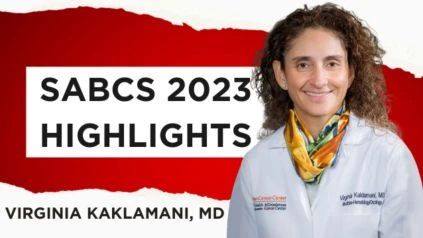By: Virginia Kaklamani, MD
Date: 12/8/2023
Virginia Kaklamani, MD, a professor of medicine in the Division of Hematology and Oncology at UT Health San Antonio and the leader of the breast cancer program at UT Health San Antonio MD Anderson Cancer Center, engaged in a conversation at SABCS 2023. Kaklamani shared insights on the highlights and trends observed during the event.
Discussing various themes, the conference explored prevention strategies for breast cancer on chemopreventive strategies and estradiol level assessments to identify high-risk individuals. The discussions extended to advancements in early-stage treatment, exploring topics such as radiation therapy necessity and axillary node dissection after neoadjuvant chemotherapy.
Kaklamani touched upon the integration of immunotherapy in the treatment of HR-positive breast cancer, emphasizing the need for further exploration of biomarkers. Presentations included updates from the Catherine trial, showcasing improved overall survival in HER2-positive early-stage breast cancer, and the NAVO trial’s triple combination therapy for endocrine-resistant metastatic PIK3CA-positive breast cancer.
Reflecting on key abstracts, Kaklamani highlighted the Catherine trial’s data on TDM-1 in HER2-positive breast cancer and the NAVO trial’s success in a challenging subset of metastatic HR-positive breast cancer.
Addressing the evolving needs and challenges faced by researchers, clinicians, and patients, Kakamani emphasized the significance of sessions focusing on lobular carcinoma, inflammatory breast cancer, prevention, and advancements in ctDNA and circulating tumor cells.
Regarding developments, Kakamani discussed drug combinations, specifically from the HER2 CLIMB O2 trial and the NAVA trial, emphasizing their potential impact on breast cancer treatment.
Looking ahead, Kaklamani shared a vision for SABCS as a collaborative platform where researchers and clinicians come together to create effective therapies, expand traditions, and work towards finding a cure for breast cancer. The legacy of SABCS, she emphasized, lies in its role as a catalyst for advancing breast cancer research and knowledge translation.

